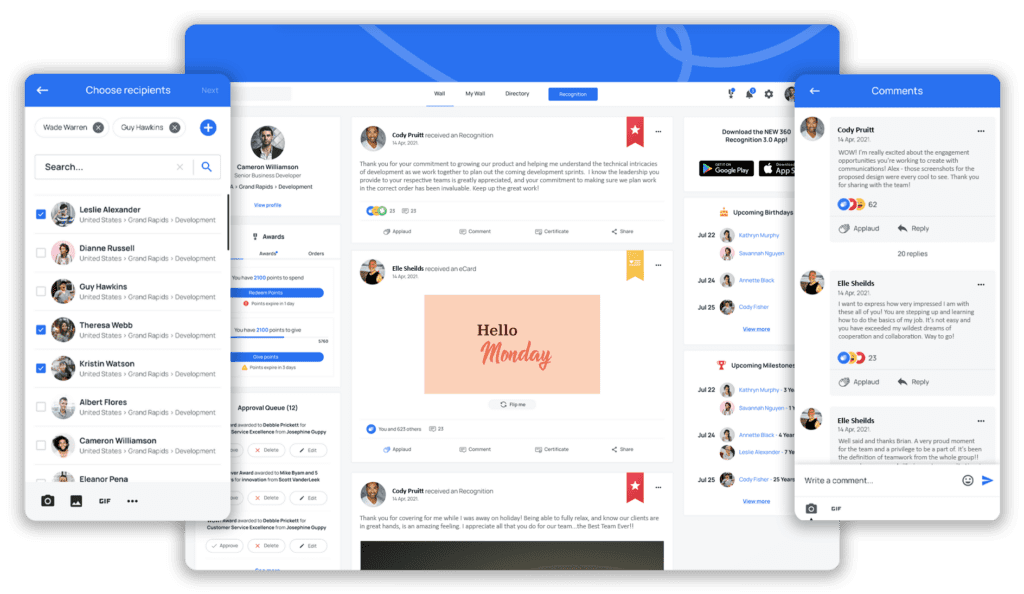April 21, 2023

Research shows that highly-engaged employees bring in 21% more profit to an organization than disengaged employees. Conversely, disengaged employees cost US companies around $450 - 550 billion a year.
This should lead managers and leaders to ask themselves a few questions about their organization - What kind of workspace culture do you provide as an organization? Are your employees engaged or disengaged? Do you motivate your employees in an impactful way?
In this article, we’ll explore how to motivate your employees to perform better while becoming more engaged overall.
How to Motivate Employees to Perform Better: 7 Best Ways
As a leader, you might think money is the most effective way to motivate your employees. In fact, your employees might even think that themselves. But research shows that this is typically not the case.
So how can you encourage your employees in a meaningful way? Let’s look at some of the best ways in which you can motivate your employees:
- Employee Recognition
- Collaboration with Upper Management
- Attainable Goals and Objectives
- Define their ‘WHY’
- Positive Workplace and Culture
- Career Growth
- Listen to What They Have to Say
RELATED: What Is Employee Connection? (7 Ways to Improve Connections)
1. Employee Recognition
One survey of over 2,000 employees found that nearly half of the American workers (46%) have left a job because they feel unappreciated. Another 65% of respondents said they would work harder if they felt like their contributions would be noticed by management.
This might be shocking at first, but how companies recognize and appreciate their employees is the big question. A small token of appreciation could eventually lead your employees to excel in their projects and complete their day-to-day tasks efficiently.
At the end of the day, everyone wants genuine recognition for their hard work - and your employees are no different. Therefore, make sure that your organization recognizes every win along the way - big and small.
RELATED: Peer-to-Peer Recognition Programs: 7 Ideas That Boost Engagement
2. Collaboration with Higher Management
When an employee gets to work with senior management, it can help boost their confidence to carry out their tasks. Whether it’s a newcomer or someone who’s been with the team a while, employees appreciate the opportunity to learn from an upper-level team member.
Team-building activities are great ways to have collaborative experiences within your organization. When a team of professionals collaborates with new members, the experience can be more valuable than the money to the employee.
This is especially true for younger employees. According to a LinkedIn study, 40% of young workers said they were willing to accept a 5% pay cut to work in a position that offered career growth opportunities. Additionally, 76% of Gen Zers want more opportunities to move up or increase responsibilities at work.
RELATED: How Managers Can Start Driving Performance and Retention Through Employee Engagement
3. Attainable Goals and Objectives
Did you know that 61% of employees are burnt-out due to the stress at their job?
As an organization, ensuring your employees are tasked with manageable or achievable goals is vital to motivating them. Your workload must be balanced when weighed against your monthly goals and objectives.
While it may be tempting as a leader to push your team to reach lofty goals, it might be in everyone’s best interest to rethink that strategy. Canadian businessman, Kevin O'Leary, found a trend amongst his businesses. Companies with slightly less challenging goals had lower turnover, higher morale, and better performance overall.
The key here is that when employees are a part of a team that consistently “wins,” they become more confident and more motivated to push themselves. They believe in each other and the team as a whole to succeed. So, if you want to become more profitable, you may want to reduce your performance goals.
4. Define their ‘WHY’
An employee who merely works for monetary benefits will soon get worn out by doing the same job every day. Whereas an employee with a vision and a sense of purpose in what they do will stay with the organization, irrespective of the low and high tides.
You must establish a sense of meaning in what the employee has signed up for and why it is more significant than any other career path they would have chosen. Specify how their work contributes to the greater mission of the company and why this makes an impact in the world.
When an employee sees their impact on the organization and its clients or customers, they will develop a deeper sense of purpose in their work that isn’t driven by money alone.
5. Positive Workplace and Culture
Nobody wants to work in a toxic environment. Ensure that your work culture and values are followed by all levels of management, staff, and employees. And if you notice any negative activities in your organization, now is the time to set things right before you lose employees.
Imagine an organization that mentors employees, prioritizes mental and physical wellbeing, offers sufficient PTO and mental health days, and initiates incentive programs. Who wouldn’t want to work there?

6. Career Growth
An employee is more likely to stay in your organization as long as you provide them with a career growth opportunity. New challenges in the workplace motivate employees to discover new levels of learning and responsibilities.
Be cautious of letting an employee get too comfortable with their job role and duties. Doing so has the risk of employees becoming unmotivated and disengaged. Conversely, a motivated and engaged employee will never miss a single opportunity to grow within your organization.
7. Listen to What They Have to Say
We all have bad days, but how employers handle their employees’ bad days is critical. When someone is having a rough day or an issue at work, take the time to listen to them.
According to one study, four in five employees feel they are not heard. It's critical that employees feel that they can come to you with their work frustrations and believe you'll work towards fixing the problem. Without this trust in a professional relationship, employees will likely feel discouraged and, ultimately, become disengaged.
Instead, use one-on-one discussions and feedback sessions to listen to your employees. An employee builds trust and confidence when you actively listen to them when they share their concerns and opinions.
RELATED: Employee Empowerment: How to Set Employees Up For Success
Frequently Asked Questions
1. How do you motivate employees as an employer?
As a leader, you can motivate employees through performance recognition programs, incentive awards, appreciation, career development opportunities, and involvement in important decision-making meetings.
2. How do you effectively motivate a team of employees?
- It is important to share your vision with your team
- Appreciate teamwork
- Allocate achievable goals and targets
- Create a healthy work environment
- Let your employees voice out their suggestions
- Create room for learning from their mistakes
- Trust and support your team.
3. What motivates employees at work?
Employees look for meaning and purpose in their work. However, small acts of recognition, team collaboration, a positive work culture, effective communication, and encouragement can help motivate employees, as well.
How to Motivate Employees: Have You Found Your Way of Doing It?
Though we listed some of the best ways, you must have a deeper understanding of your employees and choose a different method of motivation. Motivation isn’t an item to check off your to-do list - it takes time and consistent effort.
If you are looking for a professional employee recognition program, contact us through our Terryberry website. We offer social recognition, incentive awards and programs, wellness solutions, and milestone awards. Our social recognition platform is specifically designed to recognize all employees who work hard every day.

